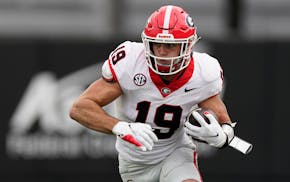It didn't take long for Stephon Williams to visualize the potential. After meeting Mike Hastings, who had just taken the head coaching job at Minnesota State Mankato, the goaltender from Alaska believed in Hastings' plan to lift the school's hockey program out of mediocrity.
"Seeing the talent they had, and knowing the direction [Hastings] wanted to go, I knew I wanted to be part of that," Williams said, recalling his 2012 visit with the coach. "I knew they were going places."
The Mavericks' destination this week is South Bend, Ind., where they begin the NCAA tournament Saturday with a first-round game against Rochester Institute of Technology (RIT). They continued to write program history this season with their first-ever No. 1 ranking, their third consecutive berth in the NCAA tournament and 29 victories, the most in the school's 19 seasons in Division I.
As pleased as they are with those achievements, the Mavericks have one more place they want to go this season: beyond the opening game of the NCAA tournament. MSU Mankato is the only one of Minnesota's five Division I men's hockey programs that has not won an NCAA tournament game. The WCHA regular-season and tournament champions enter Midwest Regional play with a 6-1-1 record in their past eight games, and their roster includes five NHL draft picks, the most ever for a Mavericks team.
Williams, who is among the top goalies in the nation, is part of a geographically diverse group committed to realizing Hastings' vision. Players from three countries, three Canadian provinces and 11 states — including California, Oklahoma, Missouri and Pennsylvania — have found common ground in their desire to create another hockey powerhouse in Minnesota.
"We're proud of the fact that we've started a tradition here, and not just with the success," Williams said. "Since Day 1, we've put in the work and the effort, with our offseason training and by pushing each other in practice every day.
"It's been an unbelievable experience. For three years, we've been building tradition in Mankato, and we want that to continue for a long time after we're gone."
The Mavericks enter the NCAA tournament ranked No. 1 in both college hockey polls. They lead Division I in winning percentage (29-7-3, .782), and Williams heads a defense that is among the nation's best. The junior has a goals-against average of 1.64, second in Division I, while MSU leads the country in fewest shots allowed per game (21.7).
Hastings came on board in April 2012 as the third coach in the program's Division I era. After an outstanding 14-year run with Omaha of the U.S. Hockey League, when he became the winningest coach in league history with 529 victories, he moved into the college ranks as an assistant with the Gophers and an associate head coach at Nebraska Omaha.
He yearned to become a head coach again, preferably in his native Minnesota. Hastings said he saw no barriers to lifting the Mavericks to the elite level, and his optimistic, ambitious outlook attracted plenty of players ready to help him do it.
"We've been fortunate to have good hockey players who aren't afraid to go to work," said Hastings, who also credited his assistant coaches and strong institutional support for the Mavericks' rise. "We have a special group of guys who wanted to leave a legacy. Our six seniors have done a lot of bricklaying, a tremendous amount of heavy lifting."
Senior defenseman Brett Stern of Lino Lakes, one of six Minnesotans on the roster, said Hastings introduced a "Maverick Way" that set the blueprint. Players were not allowed to cut corners in practice, in games or in class. They adopted a team nickname, dubbing themselves the "Pesky Mavs" in honor of the tenacious style they wanted to play.
The Mavericks doubled their victory total in Hastings' first season and made the NCAA tournament for only the second time in program history. Since then, they have improved each year. As they play in the tournament for the third year in a row, they expect their experience, and their collective drive, to help them continue to go places.
"When I committed, MSU was looked down on in a sense because of the lack of success," Williams said. "It isn't like that any more. I think we've earned a little bit of respect, but we have to continue to work for it."
Chinese Grand Prix could deliver drama to F1 and slow Verstappen's victory march
Rivalries on tap with Barcelona-Chelsea and Lyon-PSG in Women's Champions League semifinals
